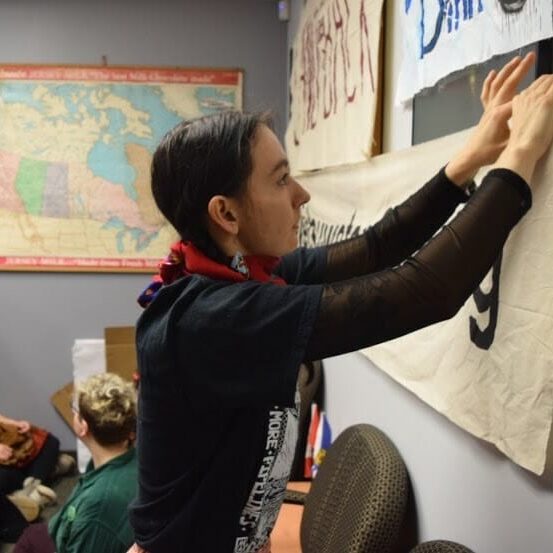
Dal reports show millions invested in pipeline owner
“It’s a slap in the face,” says Indigenous student
Dalhousie’s Indigenous students and allies are calling for acts of solidarity with Indigenous land defenders in British Columbia, as pipeline developments escalate. Last year’s Treasury Investments Report shows Dalhousie University invested over $2.3 million into TC Energy — owner of the Coastal GasLink pipeline.
A rundown of pipeline conflicts
For the last few weeks, B.C. RCMP officers have been forcefully removing and arresting Indigenous land defenders and allies from the Wet’suwet’en territories. Their defence: a court-ordered injunction, allowing Coastal GasLink to pursue the development of 670-kilometre pipeline through unceded Wet’suwet’en territories.
Wet’suwet’en hereditary chiefs have stated the pipeline cannot be built through their traditional territory without their consent. In addition, the land is of great environmental and cultural value.
British Columbia was the first province in Canada to implement UNDRIP (UN Declaration on the Rights of Indigenous Peoples). This injunction is in violation of Wet’suwet’en and Canadian law, as well as several UN articles.
Article 8.2.b. of UNDRIP reads, “States shall provide effective mechanisms for prevention of, any action which has the aim or effect of dispossessing them of their lands, territories or resources.” Significantly, article 10 states “Indigenous peoples shall not be forcibly removed from their lands or territories.”
Following these violations, Indigenous nations and allies have taken to the streets across Canada, in solidarity with Wet’suwet’en land defenders.
In Halifax, young community leaders have organized rail and bridge blockades, and a sit-in in front of MP Andy Filmore’s office.
Dalhousie’s investment
Dalhousie University, located on unceded Mi’kma’ki territory, has not released a statement in regards to the conflict of Wet’suwet’en and Canadian nations.
Dal’s March 2019 Treasury Investments report shows over $27 million publicly traded (PT) equity holdings in mining, oil and gas. Of that, $2,388,700 was invested into TransCanada Corporation — recently renamed to TC Energy. This is double the 2018 amount.
Naomi Bird, a Cree Two-spirit student at Dalhousie, and Dalhousie Student Union’s Indigenous student representative, said they are disappointed in Dalhousie for continuing to support TC Energy.
“Seeing the university financially support, thus enabling continued violence upon people and the land, by investing in TC sends a clear message to Indigenous students: the university will ignore Indigenous sovereignty and title to unceded lands when there are profits to be made.”
Bird said Dalhousie does little to support Indigenous students on campus: “no Indigenous major, inadequate funding and services for NDN students, teachers without cultural competency and anti-racist training.”
In solidarity, Bird would like the university to “divest from TC, issue a formal apology to students, faculty and community members and issue a solidarity statement with the Wet’suwet’en Nation.”
Another Indigenous student at Dal, who asked to remain unnamed, said the TC investment is a slap in the face.
“The land is so important. To me, it’s a relation,” she said. “To see the investment into something that is destructing the environment and the land, is a lot to carry. It’s really emotional.”
At a $2.3 million price point, she said “the return on investment would be so much higher, should that money be invested in Indigenous students versus investing that amount of money into a corporation that’s directly responsible for inflicting violence upon Indigenous land and Indigenous peoples.”
The student believes Indigenous students, faculty and staff on campus are significantly under-resourced. Dalhousie could provide increased funding “to help increase the representation of Indigenous students at Dalhousie. Especially Mi’kmaw students, given that we are on unceded Mi’kmaw land.”
University response
During the Feb. 11 Board of Governors meeting, DSU President Aisha Abawajy used her report time to issue a solidarity statement. A section of it read:
“The Dalhousie student council stands in solidarity with land defenders in Wet’suwet’en territory, as they continue to resist state violence […] We condemn the violent acts of Coastal Gas Link and our nation, who are acting directly in violation of Canadian and Wet’suwet’en law and the UNDRIP.”
Abawajy called on the university to engage in conversations about its TC Energy holds and divestment efforts. Dalhousie President Deep Saini responded he concurs this is a serious issue facing the planet, and is currently in discussion with other universities to create a coalition with a stance on the climate crisis, and to “stay tuned.”
Saini was not available for an interview at the time of the request.
Isa Wright, the DSU’s vice-president (Finance and Operations) said in an email statement that it’s time for Dal to put its money where its mouth is. The university “publishes their investments but refuses to discuss the implications of their investments on Indigenous students and their communities,” she wrote. “They claim to prioritize Equality, Diversity, and Inclusion, but continue to invest millions of dollars in resource extraction.”
Over 40 Dalhousie professors wrote a letter in support of Wet’suwet’en land defenders. The letter condemns the use of force to gain access to unneeded land and calls for fair government negotiations.
However, Dal spokesperson Brian Leadbetter said in an email that Dal, as an institution, will not issue a statement in regards to Wet’suwet’en. He also said the university is “very sympathetic to members of our community who are affected by this national issue.”
Leadbetter added that the university knows there is improvement to be done, and the new hire of a director of Indigenous Community Engagement will help develop “an Indigenous Strategy that will provide a framework to guide our future work in these areas.”
The anonymous Indigenous student said she believes it’s not enough to say “we’re all treaty people.”
“We need to see action, support and solidarity from people in power to make change and uphold certain Indigenous sovereignty.”






